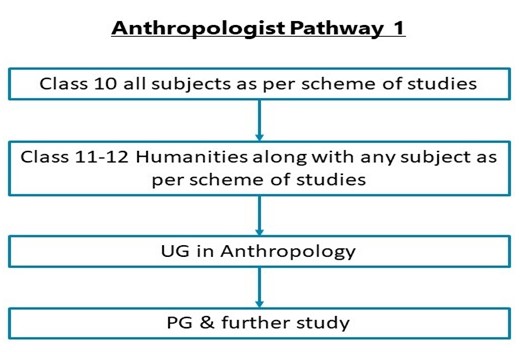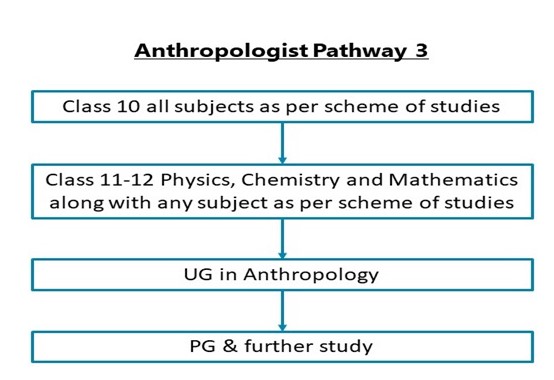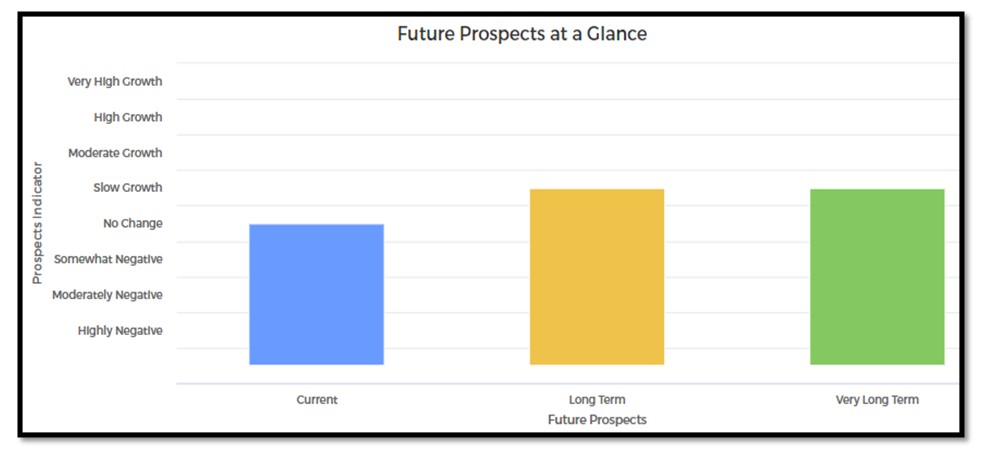Anthropologist
Entry Level Qualification
Graduate
Career Fields
Humanities, Liberals Arts & Social Science
For Specially Abled








Career Entrance Exam
About Career
1. As an Anthropologist, you will research and study about how humans evolved and how they adapted to changing environment; how human behavior evolved and developed over thousands of years; how societies formed; how culture evolved; how food habits evolved; how language evolved; and about many other related topics.
2. You will apply your knowledge in solving various present-day situations and also predict future scenarios, such as how human behavior, human societies, and languages will evolve. You may solve a present-day issue such as helping a tribe to understand the benefits of socio-economic development or advising a company or a Government as to how a particular community may react to a new product or a benefit scheme.
Key Roles And Responsibilities:
1. Present research findings for a variety of specialized and general audiences.
2. . Teach and mentor students of anthropology.
3. Plan and direct research to characterize and compare the economic, demographic, health care, social, political, linguistic, and religious institutions of distinct cultural communities.
4. Explain the origins and physical, social, or cultural development of humans, including physical attributes, cultural traditions, beliefs, resource management practices, and settlement patterns.
5. Identify culturally specific practices affecting health status and access to services for distinct populations, in collaboration with health officials.
6. Develop intervention procedures, using techniques such as individual and focus group interviews, consultations,and participant observation.
7. Advise government agencies, private organizations, and communities regarding plans and policies and their potential impacts
8. Construct and test data collection methods.
9. Collaborate with economic development planners to decide on the implementation of proposed development policies and plans.
10. Examine fossils to classify anatomical and physiological variations and to determine how they fit into evolutionary theory and aiding forensic science.
PARTICULARS | DESCRIPTION |
Name | Anthropologist |
Purpose | Study Human Societies, Cultures |
Career Field | Humanities, Liberals Arts & Social Science |
Required Entrance Exam | UGC NET |
Average Salary | 150000 - 400000 Rs. Per Year |
Companies For You | Universities, Cultural Organizations, Government Agencies & Many More |
Who is Eligible | Graduate |
Career Entry Pathway
Class 10 all subjects as per scheme of studies - Class 11-12 Humanities along with any subject as per scheme of studies - UG in Anthropology – PG & further study
After your Class 10 all subjects as per scheme of studies, you can study Class 11-12 Humanities along with any subject as per scheme of studies and then study for an undergraduate degree in Anthropology followed by a master’s degree in Anthropology. Admission to colleges based on merit list or Entrance examinations.
Class 10 all subjects as per scheme of studies – Class 11-12 Physics, Chemistry and Biology along with any subject as per scheme of studies – UG in Anthropology – PG & further study
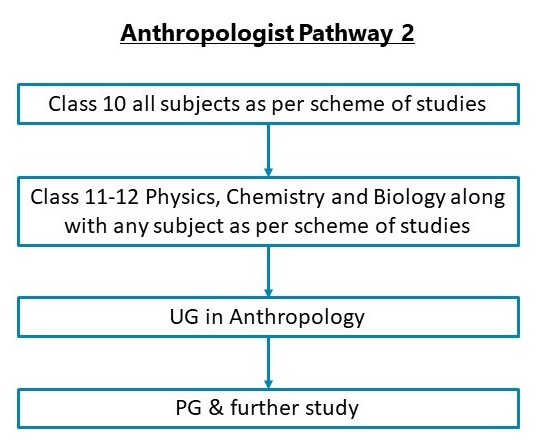
After your Class 10 all subjects as per scheme of studies, you can study Class 11-12 Physics, Chemistry and Biology along with any subject as per scheme of studies and then study for an undergraduate degree in Anthropology followed by a master’s degree in Anthropology. Admission to colleges based on merit list or Entrance examination.
Class 10 all subjects as per scheme of studies –Class 11-12 Physics, Chemistry and Mathematics along with any subject as per scheme of studies - UG in Anthropology – PG & further study
After your Class 10 all subjects as per scheme of studies, you can study Class 11-12 Physics, Chemistry and Mathematics along with any subject as per scheme of studies then study for an undergraduate degree in Anthropology followed by a master’s degree in Anthropology. Although it is advisable to have taken Biology or history, their absence do not necessarily dampen your future study prospects in anthropology.Admission to colleges based on merit list or Entrance examination
Class 10 all subjects as per scheme of studies –Class 11-12 Humanities along with any subject as per scheme of studies -UG in History or Archaeology – PG & further study
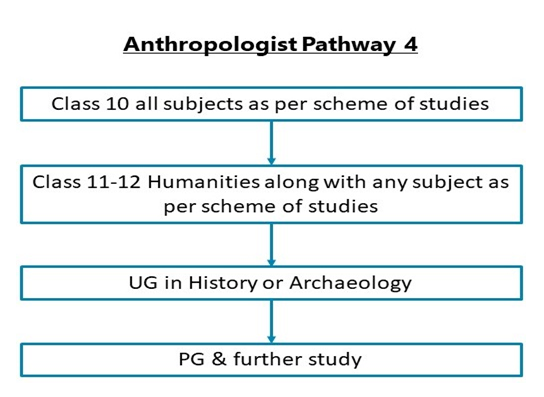
After your Class 10 all subjects as per scheme of studies, you can study Class 11-12 Science along with any subject as per scheme of studies and then study for an undergraduate degree in History or Archaeology, and then follow it up with masters and further study in Anthropology.
Class 10 all subjects as per scheme of studies - Class 11-12 Science along with any subject as per scheme of studies - UG in Biological Science- PG and further study Anthropology
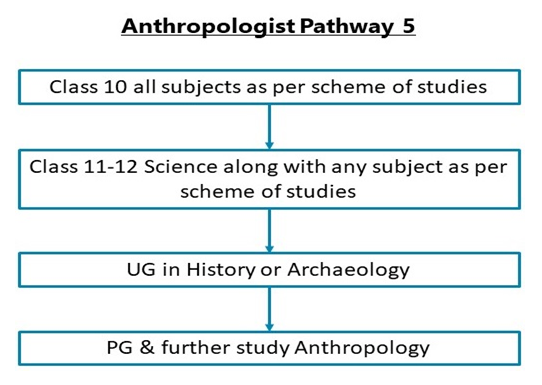
After your Class 10 all subjects as per scheme of studies, you can study Class 11-12 Science along with any subject as per scheme of studies and then study for an undergraduate degree in History or Archaeology, and then follow it up with masters and further study in Anthropology.
Class 10 all subjects as per scheme of studies - Class 11-12 Science along with any subject as per scheme of studies - UG in Biological Science- PG and further study Anthropology
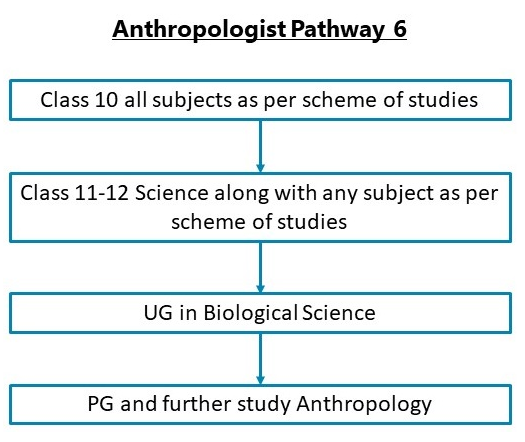
After your Class 10 all subjects as per scheme of studies, you can study Class 11-12 Science along with any subject as per scheme of studies and then study for an undergraduate degree in History or Archaeology, and then follow it up with masters and further study in Anthropology.
Required Qualification & Competencies
For Undergraduate Study
1. After finishing your Class 10 all subjects as per scheme of studies, you can study Class 11-12 Humanities/Science/Physics, Chemistry, Biology or Mathematics along with any subject as per scheme of studies, and can go for an undergraduate degree in BA (Anthropology)/BSc (Anthropology)
2. After finishing your Class 10 all subjects as per scheme of studies, you can study Class 11-12 Humanities/Science/Physics, Chemistry, Biology or Mathematics along with any subject as per scheme of studies, and can go for an undergraduate degree course in BA (Anthropology/History/Archaeology) or a Biological Science undergraduate degree.
Post Graduation And Further
1. The advanced courses offered are MA/MSc in Anthropology, MPhil (Anthropology) and PhD.
2. A master’s degree program in anthropology allows students to choose an area of emphasis or specialization, such as archaeological anthropology, forensic anthropology, linguistic anthropology, sociocultural anthropology etc.
3. Doctor of Philosophy in anthropology is a research-based degree that covers advanced topics in the stated specialization. A majority of the time in residence is spent working on a dissertation.
MINIMUM EDUCATION REQUIRED | MAXIMUM EDUCATION REQUIRED |
Post Graduate Postgraduate Degree / Diploma / Certificate Programs for which the minimum eligibility is a pass in Graduation / equivalent Diploma program like Honours Diploma or Graduate Diploma. | Post-Doctoral Post Ph.D. programs for which the minimum eligibility is a Doctoral degree. |

Competencies Required
Interests
1. Investigative: You should have interests for Investigative Occupations. Investigative occupations involve working with ideas and quite a lot of thinking, often abstract or conceptual thinking. These involve learning about facts and figures; involve use of data analysis, assessment of situations, decision making and problem solving.
2. Social: You should have interests for Social Occupations. Social occupations involve helping or assisting others; these involve working with and communicating with people to provide various services; these may involve educating and advising others.
Knowledge
Anthropology: Knowledge of how humans lived in the past, how societies developed, societal norms, relationships, languages, and behavioral patterns. This also includes study of human behaviour, societies, cultures and languages in the present so as to understand how these will evolve in the future.
Skills
1. Active Learning: Focused and continuous learning from various sources of information, observation and otherwise for application in getting work done.
2. Critical Thinking: Skills in analysis of complex situations, using of logic and reasoning to understand the situations and take appropriate actions or make interpretations and inferences.
3. Communication in English: Skills in communicating effectively in writing as well as verbally with others in English language.
4. Judgment and Decision Making: Skills in considering pros and cons of various decision alternatives; considering costs and benefits; taking appropriate and suitable decisions.
5. Instruction: Skills in training others how to do something.
6. Reading Comprehension: Skills in understanding written sentences and paragraphs in work related documents.
7. Writing: Skills in communicating effectively in writing as appropriate for the needs of the readers.
Abilities
1. Abstract Reasoning: The ability to understand ideas which are not expressed in words or numbers; the ability to understand concepts which are not clearly expressed verbally or otherwise.
2. Deductive Reasoning: The ability to apply general rules and common logic to specific problems to produce answers that are logical and make sense. For example, understanding the reasons behind an event or a situation using general rules and common logic.
3. Emotional Intelligence: The ability to understand your own and others' emotions and feelings; empathy for others; adjusting your behaviour or self-control and self-regulation according to others' emptions and situations.
4. Fluency of Ideas: The ability to come up with a number of ideas about a topic (the number of ideas is important, not their quality, correctness, or creativity).
5. Oral Comprehension: The ability to listen to and understand information and ideas presented through spoken words and sentences.
6. Verbal Reasoning: The ability to think and reason with words; the ability to reason out ideas expressed in words.
7. Written Expression: The ability to communicate information and ideas in writing so others will understand.
Personality
1. You are a soft-hearted person sometimes.
2. You trust others sometimes but not always.
3. You are helpful to others sometimes.
4. You are imaginative sometimes.
5. You prefer to experience new things and have new experiences sometimes.
6. You are caring, supportive, sympathetic and kind to others sometimes.
Career - Job Opportunities & Profiles
1. Anthropologists predominantly work in four sectors - education, non-profit, corporate, or government. Most job roles require a Master's degree at least
2. A degree in Anthropology is also used as a preparatory degree for careers in law, policy making etc.
Following are few of the entry-level jobs as an anthropologist:
1. Research fellow at University after clearing NET-JRF, or other relevant entrance exams.
2. Associate Professor at a University as Ph.D. pursuant/holder, or clearing NET-LS exam after Masters.
3. Junior Research fellow or Assistant Research Scientist at Anthropological Survey of India.
4. Junior Research fellow or Assistant Research Scientist at Indian Council for Medical Research, after clearing ICMR JRF exam.
5. Young professional (Consultant) in Government committees such as NitiAayog, Commission for SC/ST, Minority Commission etc after post graduation.
6. Advisor in Government committees such as NitiAayog, Commission for SC/ST, Minority Commission etc after Ph.D.
7. Legal Intern
8. Capacity Building Trainer in fieldwork centric organizations such as non-profits.
9. Program Associate or Field Enumerator for both non-profits and Government Organizations
10. Community-Based Researcher or Community Development Worker
11. Content Writer
12. International/Aid development Worker with WHO, UNICEF, UNESCO et cetera.
13. UX (User Experience) researcher in the Information Technology sector (for designing user experiences of various software which might be language and culture specific)
14. Museums or Art gallery curator.
15. Crime Investigation Consultancy
16. HR representative and Diversity Officer.
17. Consultants for Screenwriting and storytelling
Work Environment
Anthropologists and archeologists typically work in universities, research organizations, non-profits, government organizations, and consulting firms. A lot of them work in educational institutes, owing to the academic nature of their work. A lot of work in offices or other environmentally controlled spaces such as laboratories or universities; some are involved in major fieldwork. Fieldwork may require travel for extended periods.
Specialisation Tracks In This Career
1. Archaelogy Anthropology
Archaeological anthropology is the study of past humans and cultures through material remains. It involves the excavation, analysis and interpretation of artifacts, soils, and cultural processes
2. Cultural Anthropology
Cultural anthropology is a branch of anthropology focused on the study of cultural variation among humans. It is in contrast to social anthropology, which perceives cultural variation as a subset of the anthropological constant
3. Linguistic Anthropology
Linguistic anthropology is the interdisciplinary study of how language influences social life. It is a branch of anthropology that originated from the endeavor to document endangered languages, and has grown over the past century to encompass most aspects of language structure and use.
4. Forensic Anthropology
Forensic anthropology is a special sub-field of physical anthropology (the study of human remains) that involves applying skeletal analysis and techniques in archaeology to solving criminal cases.
5. Biological Anthropology
Also known as physical anthropology is a scientific discipline concerned with the biological and behavioral aspects of human beings, their related non-human primates and their extinct hominin ancestors.
6. Computational Anthropology
Computational anthropology is the holistic study of humankind for understanding of human behavior, culture and evolution using computational methods. Methods include social network analysis, data mining, natural language processing, and modeling.
7. Medical Anthropology
Medical anthropology studies "human health and disease, health care systems, and biocultural adaptation". It views humans from multidimensional and ecological perspectives.
8. Museum Anthropology
Museum anthropology cross-cuts anthropology subfields (archaeology, cultural anthropology, linguistic anthropology, biological anthropology) as they are understood. All of these areas are sometimes pursued in museum contexts (usually on the basis of research work with systematic collections) and all can be (and are) explicated in museum-based exhibitions and public programs.
9. Paleoanthropology
Paleoanthropology or paleo-anthropology is a branch of archaeology with a human focus, which seeks to understand the early development of anatomically modern humans, a process known as hominization, through the reconstruction of evolutionary kinship lines within the family Hominidae, working from biological evidence (such as petrified skeletal remains, bone fragments, footprints) and cultural evidence (such as stone tools, artifacts, and settlement localities).
Career Growth
1. Career growth prospects are moderate for that of an Anthropologists. Some people use anthropology as a preparatory degree for Careers in law or public policy. Almost all of the significant job roles require a Masters or Doctorate degree.
2. Some entry-level jobs as mentioned earlier are Assistant Research Scientists, Junior Research Fellows, Associate professor, Program Associate, Young Professional (Consultant).
3. With 3-6 years of experience, you can expect to move to roles such as that of Junior Administrative Officer, Ad-Hoc Professor, Program Manager, Deputy Advisor, and so on.
4. With more than 8 years of experience, you can move to roles such as that of Professor, Joint Director, Deputy Advisor, Senior Advisor, and Senior Research Officials.
Salary Offered
1. The nature of jobs and job opportunities varies very widely as an Anthropologist. For instance, the salaries of a non-profit employee are very much dependent on the scale of funding that a non-profit can secure.
2. Entry level Program Associate salaries in a non-profit are usually in the range of Rs. 10,000- Rs. 30,000 per month.
3. With 5-6 years of experience, you can move to managerial positions and attract a salary between Rs. 40,000-Rs. 70,000 per month.
4. Assistant Research Scientists at ANSI start out with a salary of Rs.12,000-Rs.18,000 per month, and with 2-3 years of experience can move to Junior Administrative officer roles with a salary in the pay band of (Rs. 9300-Rs 34800)+ Rs. 4600 Grade Pay.
5. Junior research fellow roles attract a salary of Rs. 25000-Rs. 28,000 per month, with senior research fellows earning Rs. 30000-Rs. 32000 per month.
6. Associate Professors may start out with a salary of Rs. 23000-Rs. 25000 per month, and then move to Ad-Hoc and Permanent Roles attracting salaries in the range of Rs. 30,000-60,000 and Rs. 60,000- Rs. 1,80,000 per month respectively.
7. Organizations such as NITI offer a fresher salary as much as Rs. 60,000 to Ph.D. holders to act as Young Consultants, and Senior Research Officer are paid in the range of (Rs. 67,700- Rs. 208700) per month.
8. UX (User Experience) researchers in IT sector and HR professionals earn Rs. 50,000 - Rs 65,000 over a 5-6 year period.
9. Other profiles such as those of an International-Aid worker are travel intrinsic and attract a salary in the range of Rs. 80,000-Rs. 1,20,000 per month.
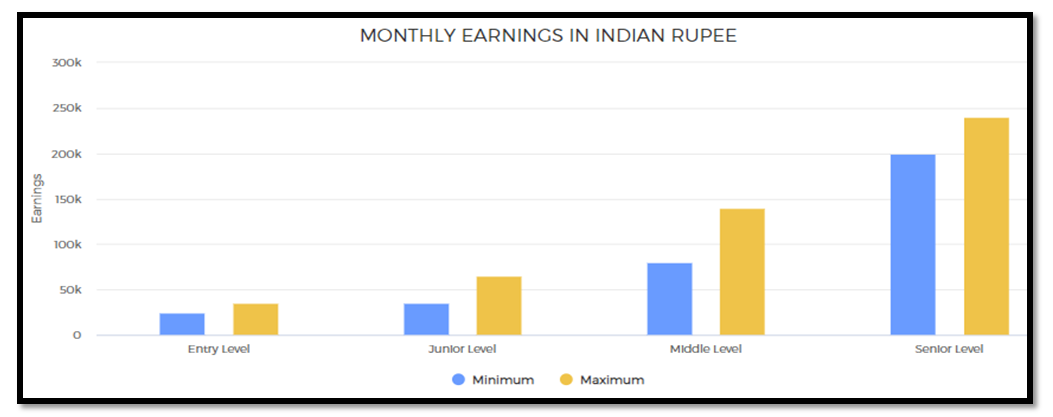
Monthly Earnings In Indian Rupee
Entry Level | Junior Level | Mid Level | Senior Level | ||||
Min Earning | Max Earning | Min Earning | Max Earning | Min Earning | Max Earning | Min Earning | Max Earning |
25000 | 35000 | 35000 | 65000 | 80000 | 140000 | 200000 | 240000 |
1. Entry level: 0 - 2 years of work experience
2. Junior Level: From 1 to 12 years of work experience
3. Mid Level: From 5 to 20+ years of work experience
4. Senior Level: From 10 to 25+ years of work experience (there could be exceptions in some high-end technical, financial, engineering, creative, management, sports, and other careers; also in the near future, people will reach these levels much faster in many careers and in some careers, these levels will have no meaning as those careers will be completely tech skill driven such as even now, there is almost no level in a Cyber Security Expert’s job).
Work Activities
1. Communicating with co-workers and others: Communicating with people in writing, verbally or otherwise inside your workplace and various other people who have professional relationships with your place of work including vendors, government officials, etc. or with people at large.
2. Creative thinking: Developing new ideas, concepts, innovative solutions to problems, newer ways of getting things done, designing products and services, creating work of art and craft, etc.
3. Decision making and problem solving: Analysis of data and information; evaluation of alternative decisions and results of decisions; taking the right decisions and solving problems.
4. Getting Information and learning: Observing, hearing, reading, using computers, or otherwise obtaining information and learning from it.
5. Providing advices and consultation to others: Giving advices or consultation to others about various issues, conceptual matters, know-hows, scientific matters, products or services.
6. Updating and using relevant knowledge: Keeping updated with the latest knowledge relevant to your fields of work and use of the relevant knowledge in getting things done.
Future Prospects
1. India’s higher education sector is expected to increase to US$ 35.03 billion. India also has one of the largest networks of higher education institutions in the world. Gross Enrolment Ratio (ratio of students enrolling for higher studies) in higher education reached 25.8 per cent, which indicates a growing interest in higher studies.
2. The Ministry of Human Resource Development, Government of India is also planning to raise around Rs 1 lakh crore (US$ 15.52 billion) from private companies and high net worth individuals to finance improvement of education infrastructure in the country.
3. Anthropology job profiles mostly lie in the higher education or research sectors. The above data cites favorable growth in these industries in the coming future as well as the growing interest of students into higher education, as well as greater access of higher education, all of which indicate favorable future prospects for anthropologists in India.
Future Prospects At A Glance
Current (0-1 year) | Long Term (2-5 year) | Very Long Term (6-10 years) |
No Change | Slow Growth | Slow Growth |

